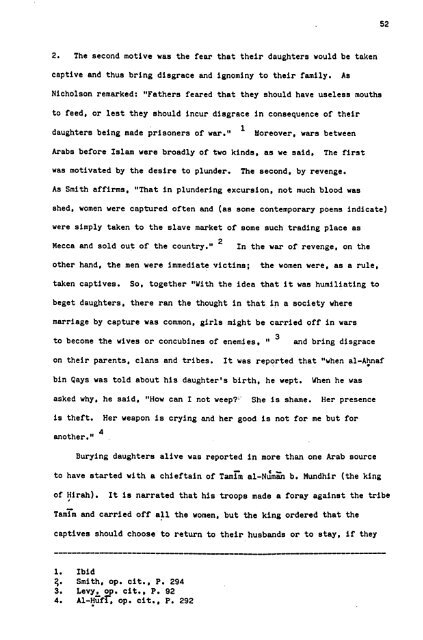Download - University of Salford Institutional Repository
Download - University of Salford Institutional Repository
Download - University of Salford Institutional Repository
You also want an ePaper? Increase the reach of your titles
YUMPU automatically turns print PDFs into web optimized ePapers that Google loves.
2. The second motive was the fear that their daughters would be taken<br />
captive and thus bring disgrace and ignominy to their family. As<br />
Nicholson remarked: "Fathers feared that they should have useless mouths<br />
to feed. or lest they should incur disgrace in consequence <strong>of</strong> their<br />
daughters being made prisoners <strong>of</strong> war. " Moreover, wars between<br />
Arabs before Islam were broadly <strong>of</strong> two kinds, as we said, The first<br />
was motivated by the desire to plunder. The second. by revenge.<br />
As Smith affirms, "That in plundering excursion. not much blood was<br />
shed. women were captured <strong>of</strong>ten and (as some contemporary poems indicate)<br />
were simply taken to the slave market <strong>of</strong> some such trading place as<br />
Mecca and sold out <strong>of</strong> the country. " 2<br />
In the war <strong>of</strong> revenge, on the<br />
other hand, the men were Immediate victims; the women were. as a rule.<br />
taken captives. So, together "With the idea that it was humiliating to<br />
beget daughters, there ran the thought in that in a society where<br />
marriage by capture was common, girls might be carried <strong>of</strong>f in wars<br />
to become the wives or concubines <strong>of</strong> enemies, 11 3<br />
and bring disgrace<br />
on their parents, clans and tribes. It was reported that "when al-Aýnaf<br />
bin Qays was told about his daughter's birth, he wept. When he was<br />
asked why. he said, "How can I not weepT' She is shame. Her presence<br />
is theft. Her weapon is crying and her good is not for me but for<br />
another. 11 4<br />
Burying daughters alive was reported in more than one Arab source<br />
to have started with a chieftain <strong>of</strong> Tamim al-NumMi b. Mundhir (the king<br />
<strong>of</strong> Hirah). It is narrated that his troops made a foray against the tribe<br />
It<br />
Tamim and carried <strong>of</strong>f all the women. but the king ordered that the<br />
captives should choose to return to their husbands or to stay. if they<br />
Ibid<br />
Smith. op. cit.. P. 294<br />
3. Le yP p cit., P. 92<br />
*op.<br />
4. Alzfý,<br />
cit., P. 292<br />
52
















